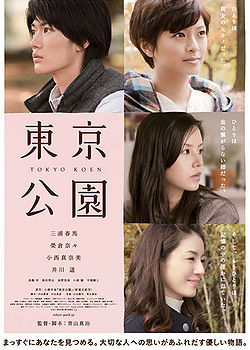Top Qs
Timeline
Chat
Perspective
Tokyo Park
2011 Japanese film From Wikipedia, the free encyclopedia
Remove ads
Tokyo Park or Tokyo Koen (東京公園, Tōkyō Kōen; literally Tokyo Park) is a 2011 Japanese drama film directed by Shinji Aoyama. It is based on the novel Tokyo Koen by Yukiya Shoji.[1][2] It was released in Japanese cinemas on 18 June 2011.[3]
Remove ads
Plot
Miura Haruma takes on the role of Koji, a college student aiming to become a professional photographer. One day, he receives an unusual request to shadow the client's girlfriend and take pictures of her; this assignment leads to subtle changes in his relationships with the women around him. Nana Eikura plays the ex-girlfriend of Koji's childhood friend, while Manami Konishi plays Koji's sister after one of her parents remarries, and Haruka Igawa plays the woman that Koji is photographing.
Remove ads
Cast
- Haruma Miura as Koji Shida
- Nana Eikura as Miyu Tominaga
- Manami Konishi as Misaki Shida
- Haruka Igawa as Yurika Hatsushima
- Shota Sometani as Hiro Takai
- Yo Takahashi as Takashi Hatsushima
- Takashi Ukaji as Kenichi Haraki
Release
Tokyo Koen was showcased at the 64th Locarno International Film Festival to compete for the Golden Leopard award in August 2011.[4] The film was awarded a special Golden Leopard to honor Aoyama's career.[5]
Reception
Mark Shilling of The Japan Times gave the film a rating of 3.5 stars out of five. He noted that the film was "a new outlook and approach" by the director Shinji Aoyama. He described the character Koji as "an amiable, passive empty slate on which the more aggressive, knowing types around him can write their own dramas".[6] Neil Young of The Hollywood Reporter said Tokyo Park was Aoyama's most mainstream, conventional film. He cited "the insipid blandness of a daytime soap-opera, lacking anything resembling urgency, edge or originality", saying that the cinematography was "picturesquely banal" and the score was "jauntily intrusive".[5] Jay Weissberg of Variety felt that the film existed in an airless state despite its outdoor sequences.[7]
Remove ads
References
External links
Wikiwand - on
Seamless Wikipedia browsing. On steroids.
Remove ads

